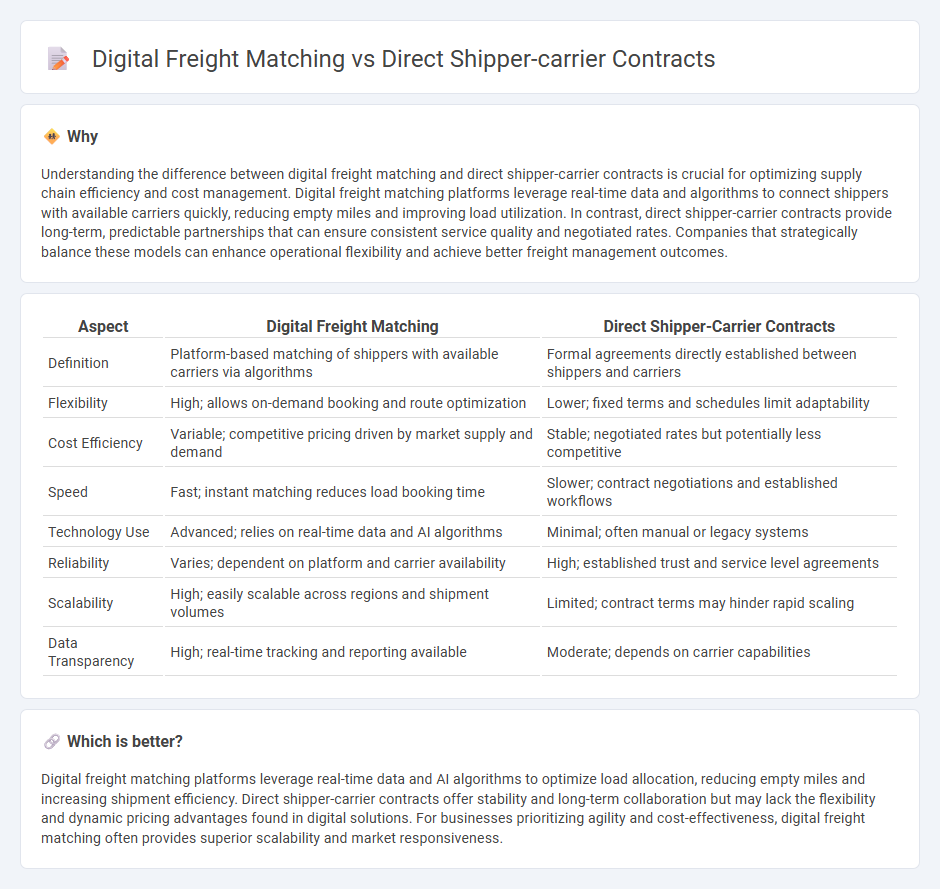
Digital freight matching platforms use real-time data algorithms to connect shippers and carriers efficiently, reducing empty miles and increasing load visibility. Direct shipper-carrier contracts offer long-term partnerships with negotiated rates and customized service levels, enhancing reliability and predictability in shipping operations. Explore how these solutions transform supply chain logistics and improve freight management.
Why it is important
Understanding the difference between digital freight matching and direct shipper-carrier contracts is crucial for optimizing supply chain efficiency and cost management. Digital freight matching platforms leverage real-time data and algorithms to connect shippers with available carriers quickly, reducing empty miles and improving load utilization. In contrast, direct shipper-carrier contracts provide long-term, predictable partnerships that can ensure consistent service quality and negotiated rates. Companies that strategically balance these models can enhance operational flexibility and achieve better freight management outcomes.
Comparison Table
| Aspect | Digital Freight Matching | Direct Shipper-Carrier Contracts |
|---|---|---|
| Definition | Platform-based matching of shippers with available carriers via algorithms | Formal agreements directly established between shippers and carriers |
| Flexibility | High; allows on-demand booking and route optimization | Lower; fixed terms and schedules limit adaptability |
| Cost Efficiency | Variable; competitive pricing driven by market supply and demand | Stable; negotiated rates but potentially less competitive |
| Speed | Fast; instant matching reduces load booking time | Slower; contract negotiations and established workflows |
| Technology Use | Advanced; relies on real-time data and AI algorithms | Minimal; often manual or legacy systems |
| Reliability | Varies; dependent on platform and carrier availability | High; established trust and service level agreements |
| Scalability | High; easily scalable across regions and shipment volumes | Limited; contract terms may hinder rapid scaling |
| Data Transparency | High; real-time tracking and reporting available | Moderate; depends on carrier capabilities |
Which is better?
Digital freight matching platforms leverage real-time data and AI algorithms to optimize load allocation, reducing empty miles and increasing shipment efficiency. Direct shipper-carrier contracts offer stability and long-term collaboration but may lack the flexibility and dynamic pricing advantages found in digital solutions. For businesses prioritizing agility and cost-effectiveness, digital freight matching often provides superior scalability and market responsiveness.
Connection
Digital freight matching platforms streamline logistics by connecting shippers directly with carriers, reducing reliance on traditional brokers and increasing transparency. These platforms enable direct shipper-carrier contracts by facilitating immediate access to real-time freight capacity and shipment details, enhancing negotiation efficiency. The integration of digital freight matching with direct contracts optimizes route planning, lowers operational costs, and improves overall supply chain responsiveness.
Key Terms
Contract Rates
Direct shipper-carrier contracts ensure fixed contract rates negotiated upfront, providing predictable shipping costs and budget stability for shippers and carriers. Digital freight matching platforms use dynamic pricing models that adjust contract rates in real-time based on supply and demand algorithms, offering flexibility but less rate certainty. Explore how these pricing structures impact logistics efficiency and cost management.
Load Board Platforms
Direct shipper-carrier contracts provide tailored agreements that optimize freight cost and capacity management by establishing long-term partnerships and dedicated lanes. Load Board Platforms utilizing Digital Freight Matching leverage AI to instantly connect shippers with available carriers, enhancing shipment efficiency and reducing empty miles. Explore how integration of these strategies can transform your logistics operations and maximize load board potential.
Real-time Matching
Direct shipper-carrier contracts offer fixed agreements ensuring consistent capacity and predictable pricing, while digital freight matching platforms provide real-time matching of shipments with available carriers, optimizing load fulfillment and reducing empty miles. Digital freight matching leverages advanced algorithms and location data to instantly connect shippers with carriers, enhancing operational efficiency and responsiveness. Explore how real-time matching transforms logistics by visiting our detailed analysis.
Source and External Links
The Rise of Direct Shipper Contracts: Revolutionizing Freight Logistics - Direct shipper contracts are agreements between shippers (such as manufacturers or retailers) and carriers (like trucking companies or airlines) that bypass brokers, enabling customized rates, volume commitments, and tailored service terms for more efficient logistics operations.
Best Way to Establish a Relationship with Direct Shippers - DAT - Working directly with shippers eliminates broker fees, provides more consistent work and stable rates, and fosters stronger business relationships, helping carriers improve profitability and service reliability.
5 Of The Best Ways To Establish Relationships With Direct Shippers - Direct shipper-carrier contracts allow for direct negotiation of rates, clear communication about equipment and scheduling needs, and greater flexibility in addressing unforeseen changes or opportunities, ensuring steady, reliable business for carriers.
 dowidth.com
dowidth.com